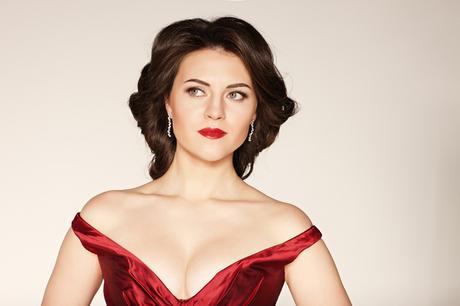 Foto ©Rainer Pfisterer
Foto ©Rainer Pfisterer
Anche quest’ anno, più di settemilatrecento spettatori sono venuti ad assistere al Klassik Open Air & Feuerwerk del Ludwigsburger Schlossfestspiele, nella splendida cornice del parco del Seeschloss Monrepos. Si tratta di un concerto il cui programma è dedicato al grande repertorio popolare e viene concluso da uno spettacolo di fuochi artificiali. Una serata che col tempo è diventata uno degli appuntamenti immancabili per tutti gli appassionati della zona, che arrivano a frotte per godersi due ore di musica in un ambiente rilassato, con la possibilità di fare anche un picnic e trovare un po’ di sollievo dalla calura imperante in mezzo ai castagni secolari del parco del Monrepos, antica palazzina di caccia dei re del Württemberg annessa nel XIX secolo al complesso del Residenzschloss e del Lustschloss Favorite. Quest’ anno il programma del concerto era dedicato al grande repertorio operistico italiano e per me rappresentava un appuntamento da non mancare assolutamente per la presenza come solista di Venera Gimadieva, il giovane soprano russo che tanto favorevolmente mi aveva impressionato nella Traviata dello scorso agosto a Glyndebourne di cui all’ epoca ho riferito qui. Ero rimasto molto colpito dal talento di questa giovane cantante e da allora attendevo l’ occasione di ascoltarla dal vivo e, possibilmente, di incontrarla. Dopo questa serata posso affermare di aver avuto piena conferma del talento davvero inusuale della giovane cantante originaria di Kazan, il cui debutto al Ludwigsburger Schlossfestspiele è stato assolutamente eccezionale e festeggiatissimo.
 Foto ©Holm Wolschendorf
Foto ©Holm Wolschendorf
Il programma vero e proprio era introdotto dall’ esibizione dei cinquanta ragazzi dell’ orchestra del Goethe-Gymnasium diretti da Benedikt Vennefrohne, il loro insegnante di musica, che hanno dato prova di buona preparazione e compattezza d’ insieme. Subito dopo iniziava la parte ufficiale della serata, con l’ Orchester der Ludwigsburger Festspiele che sotto la direzione del giovane maestro inglese Duncan Ward, per la seconda volta invitato a condurre il Klassik Open Air, ha eseguito una serie di brani operistici sinfonici che introducevano e inframmezzavano la parte vocale. Duncan Ward è un giovane direttore che sta iniziando una bella carriera internazionale sotto la tutela artistica di Sir Simon Rattle, che lo ha voluto a capo del complesso dell’ Orchester-Akademie dei Berliner Philharmoniker. Sotto la sua direzione l’ orchestra del festival ha dimostrato una bella compattezza di suono e un’ ottima qualitá timbrica. Tra i vari brani orchestrali mi sono piaciuti particolarmente l’ Intermezzo della Cavalleria Rusticana, reso da Ward con un tono sobrio ed espressivo diverso dall’ enfasi con cui spesso viene sovraccaricata questa pagina, e le Sinfonie verdiane dal Nabucco e da Luisa Miller, notevoli per lo slancio espressivo e l’ accuratezza dinamica trovati dalla bacchetta.

Ma veniamo adesso a parlare di Venera Gimadieva e della stupenda prestazione con cui la giovane cantante russa ha letteralmente incantato il pubblico del Klassik Open Air. Tutto ciò che di buono avevo scritto in occasione della sua Traviata di Glyndebourne ha ricevuto piena conferma in questa serata. La Gimadieva ha una voce di timbro rotondo e luminoso, sorretta da una preparazione tecnica di livello ragguardevole che le permette un perfetto controllo delle dinamiche. Le mezzevoci e i pianissimi sono perfettamente timbrati e mai disuguali nella qualità del suono rispetto al forte e gli acuti suonano sempre ottimamente proiettati. Ma quello che rende già così notevole il talento di questa giovane artista è il carisma e la personalità di fraseggio, basata su una pronuncia italiana impeccabile e una dizione netta e definita a un livello che pochissime volte è dato di riscontrare in una cantante non di lingua madre italiana. Con questi requisiti di base la cantante è in grado di trasmettere tutte le emozioni che il suo notevolissimo talento di fraseggiatrice le suggerisce, spaziando dal tono morbidamente melanconico delle scene di pazzia dai Puritani e dalla Lucia di Lammermoor fino all’ incantevole arguzia piccante conferita alle arie di Musetta e di Norina e all’ intenso lirismo dell’ aria di Lauretta dal Gianni Schicchi. Il rondò di Elena dai Vespri Siciliani ha confermato il buon dominio della coloratura che la Gimadieva aveva mostrato nelle due scene di pazzia, a cui mancava forse solo un uso del trillo meglio definito. Non poteva naturalmente mancare nel programma un saggio di quella Violetta con cui Venera Gimadieva si sta affermando sui grandi palcoscenici internazionali. L’ esecuzione di “Addio del passato” ha ribadito, con la commossa e lancinante intensità del fraseggio che la Gimadieva ha esibito, il valore assoluto di una caratterizzazione che io non esito a definire una delle più complete tra tutte quelle delle cantanti che in questi ultimi anni hanno affrontato la parte. Fin dalle prime note cantate da Venera Gimadieva il pubblico ha capito di essere di fronte a un talento autentico, genuino e ricco di carisma, e il successo tributato alla giovane cantante russa è stato davvero grandioso. Il consueto spettacolo di fuochi artificiali, sulle note della Sinfonia dei Vespri Siciliani e della Marcia Trionfale dell’ Aida, ha concluso in un clima festoso una serata davvero da ricordare.

Al termine del concerto ho potuto incontrare Venera Gimadieva per mettere a punto i particolari dell’ intervista che avevamo concordato in forma scritta nei giorni precedenti. Il giovane soprano russo non parla italiano, cosa che non ha mancato di sorprendermi vista la perfezione con cui lei pronuncia la nostra lingua nel canto, e quindi la conversazione si è svolta in inglese. Ecco la trascrizione del nostro colloquio.
- Miss Gimadieva, I was very impressed from your vocal and dramatic characterisation when you performed Violetta the last year in Glyndebourne. Let me ask you first about singing Traviata. Do you enjoy always singing the role?
La Traviata is my “bread and butter”, and of course I love it. This is the part with which I started my international career. But the most important thing is that this a genius music and it has lived through centuries.
- In my review of the Glyndebourne’ s production I have written that I found your Violetta was an effective portrait, not the usual prostitute of high rank but rather a young girl full of life and hopes that gradually sees her dreams succumbing in front of an unchangeable fate. How did you study the role?
First, I have read the Dumas’ book and it really touched me. I was amazed by not only the portrayal of the main character herself, but mostly by the sensuality she had. From one Traviata to another various details were emerging, so I could see the role from very different perspectives. So I keep discovering it and this is the most interesting feature of this part.
- How did you decide to become an opera singer?
I have always wanted to sing, as long as I remember yourself, although I haven’ t always had opera as my particular purpose. I have to be grateful to my teachers who lead me towards opera step by step.
- How do you study the roles that you have to prepare?
It’ s really not a rocket science. I just take the vocal score and start getting through it. Gradually I grow more and more familiar with the notes, words, history, background and everything to do with the role.
- And with regard to thestage and acting?
When I already know the meaning and the depth of the role, I am starting to search my organic place within it, the reasons and the consequences of the actions. From this the acting grows logically, easily and naturally. And of course the ideas of the director are very important, it’ s fascinating to learn how our perceptions of the role coincide or differ.
- The profession of opera singer does also entail sacrifices, especially for a young woman?
Certainly there are limitations, but there is no sacrifice. This is my understanding of my profession and I welcome it. Of course the support of my loved ones is extremely important.
- Have you had any model among the singers of past generations and recordings?
I really like Anna Moffo. I listen to her when my voice feels tired or when I cannot quite find the right interpretation. But there are many singers I can learn from.
- Among the conductors you’ ve worked with, who was the one who taught you the most?
I could have named a few, but in all honesty every director I work with gives me something to learn from.
- Can you give me a definition of vocal technique? It is more important the technique or the dramatic temperament in the interpretative characterization of an operatic role?
I must admit, sometimes I have to compromise my technique for the sake of deeper characterization. This is not ideal, but if it helps me to reach out to the audience, I feel this is the right thing to do. They say, it’ s our imperfections that makes us interesting and unique. I believe this applies to singing as well.
- How can be reconciled the difficulties of technically controlling the voice, yet be credible in acting?
Technique is normally adapted at the rehearsals, well before we get on stage. It has to be in your bones, deep inside you, then you stop thinking of it. This applies to acting as well, but it is less predictable, it’s more spontaneous, and every day it is fresh and different. While technique stays on the same height you brought to at the early stages of working on the role. Then acting and vocal technique complement each other.
- Do you strive for the perfection when you select your roles, or would you do some roles that you are not happy with?
I try not to sing those roles I don’t like. However, I can think of some roles that are not necessarily ideal for my character, but I would love to try them. so to see myself out of my comfort zone.
- So when you’ re on the stage in a role that you believe in, you give it everything?
I think I do, but I also hope that the impact of this commitment will grow with time.
- What do you think of music criticism? Do you read the reviews after a performance?
Of course I read my reviews. I find it very useful to read them: these are the opinions you might never hear face to face, and you can learn from them. But it is important to apply common sense to any criticism.
- Do you think that opera should speak to everyone?
The audience should be psychologically accretive to this music. It doesn’ t mean they have to have classical music education or to be highly intellectual etc. Every person who would like to benefit from opera should have a desire to learn from it something for themselves. Ideally I would love to bring opera to everyone, but it might not be possible. As I myself might not understand the highest points of mathematics, some people might not be inclined toward opera. And this is absolutely natural.
- Can you tell us something about your future projects?
In the near future I am going to sing Lucia di Lammermoor in France. And of course my first appearance in Covent Garden in London as Violetta.
- Finally, let me ask you something about the present concerto. Is this your first experience with the German public?
This is not my first appearance in Germany. My first time was when I had just graduated from conservatoire, I sang in Dresden. And recently I had a chance to take part in charity concert AIDS Gala in Berlin. But the concert in Ludwigsburg is my first experience of an open air concert in Europe.
- Thank you so much miss Gimadieva!
A conclusione di questo post, ricordo che la Traviata di Glyndebourne con Venera Gimadieva sarà pubblicata in DVD alla fine di questo mese. Consiglio caldamente a tutti gli appassionati di acquistare questo documento di una magnifica interpretazione.

